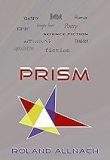Author Bio: Roland Allnach

Hi! Thanks for visiting our webpage all about Roland Allnach.
Books on the left are by Roland Allnach. Click on the book cover to purchase.
This interview was conducted by Douglas R. Cobb on February 17, 2011.
Recently, I had the good fortune to read an anthology of Military SF, Remnant, by an up-and-coming author, Roland Allnach. It’s composed of three suspenseful, page-turning novellas, “All the Fallen Angels,” “Enemy, I Know You Not,” and “Remnant”. Roland Allnach has graciously agreed to be
interviewed by me, and I hope you all like reading this interview as much as I enjoyed interviewing Mr. Allnach. Without any further ado, let’s get on to the questions!
Douglas R. Cobb: Who have been some of your literary influences, Roland, and why did you choose to write in the science fiction genre?
Roland Allnach: Over the years I’ve been inspired by numerous sources, but a consistent source of influence has been nineteenth century literary classics (primarily Tolstoy, Flaubert, and Kate Chopin). This may sound a little odd, given the material in “Remnant,” but I look at these as character driven stories, and the way I see things, the novels that are considered classics today have one enduring factor: accessible characters, with traits and dilemmas that have appeal transcending their time. Growing up I was a big fan of science fiction and fantasy (William Gibson and Michael Moorcock foremost, respectively) and my friends and I spent a lot of time with role playing games. I think that’s where the writing bug first bit me, and why the underlying ideas of my stories tend to be a little ‘out there’, whether they are science fiction, fantasy, horror, or just plain strange.
Douglas R. Cobb: The first two stories of your anthology are Military SF ones. You write very realistically, making the stories come to life for your readers. Have you ever been in the military yourself, or does the realism come more from just doing good research and paying attention to the details?
Roland Allnach: Although I did toy with the idea of joining the military when I was eighteen, I have not in fact served. But growing up I found myself drawn to military documentaries, such as the classics World at War and Vietnam: the 10,000 Day War. So through such exposure my curiosity was opened to military history, of which I’ve read quite a number of books over the years (I read a lot of John Keegan). I’m glad there is a sense of realism that translates from my writing; I believe people speak a certain way in whatever professional pursuit they follow, and with time and care that can be emulated. So yes, it is a great deal of study, combined with some ruthless self-editing, compelled by the single question of Does it sound real? combining to produce the words I put to paper.
Douglas R. Cobb: As I was reading, I was reminded of the old black-and-white television show, Twilight Zone. Are you a fan of the series?
Roland Allnach: I wouldn’t describe myself as a die-hard Twilight Zone fan, but I do have a number of ‘favorite’ episodes. My father is a big fan of not only TZ, but of the shows from those early golden years of sci-fi, such as the Outer Limits and One Step Beyond, and I remember watching many of those episodes together. Those were good shows, with many interesting ideas. Technology was exploding around humanity back in those days, and with it, of course, came the opportunity for so many questions as to where we would go in the future, and what things could go wrong. I still think those old shows portrayed an economy of story telling you don’t really see anymore, packing big ideas and fundamental mysteries in short episodes. Best of all, they didn’t always try to offer an answer, but instead sometimes left a final interpretation open to individual thought. The ‘open ending’ style of story telling is not an easy thing to do well, and it’s a tradition of fiction you don’t see too often except in some of the great anime movies that have come out of Japan, like Akira or Ghost in the Shell.
Douglas R. Cobb: Now, let’s get on to some specific questions about the three novellas in your anthology, Remnant. Who are the “Fallen Angels,” of the title of the first novella, “All the Fallen Angels”?
Roland Allnach: The Fallen Angels is a double reference. The surface reference is to the death squads enacted by Stohko Jansing to bring peace to the insurrection of Hermium. In this role, there is a play on the expression, and the idea was to allude to the loss of innocence for Stohko and his men as they stir from their lassitude and exact a terrible revenge for Stohko’s loss. The hidden reference is to the unfortunate children who were abducted from Hermium to feed the disastrous experiment of the Hermium euphoria, the effort to project emotions across a planet to contol human behavior en masse. They too have had their innocence stolen from them, and so the title of the story, “All the Fallen Angels” primarily refers to Stohko’s atonement in his involvement with these children, with the double reference to indicate the general loss of innocence throughout, and the driving need for redemption.
Douglas R. Cobb: So many people have been in the news lately who have been declared war criminals, and who have been placed on trial for war crimes. Why is Colonel Stohko Jansing placed on trial? Who is Piccolo and why does Stohko need the pills he gets from him?
Roland Allnach: Stohko was put on trial primarily for the murder of a nine year old girl, but in a larger sense, all the horrible crimes his death squads committed on Hermium were laid at his feet. Although he was responsible for these crimes on the surface, beneath lay the madness induced by the Hermium euphoria. Stohko’s actions and the euphoria became entangled over Stohko’s stay on Hermium, as he was unwittingly drawn into the euphoria, and more importantly, the euphoria was drawn to him in his desire to settle with his wife on the planet and start a family. He wanted children, and the lost children of the euphoria experiment wanted someone to care for them. After his trial, those responsible for the euphoria experiment tried to burn his attachment with the euphoria out of his mind, and as a result, left him with some serious side effects. The pills he takes are not only to stabilize his mind, but to keep him under the watchful eye of the military. His recourse is to get black market medication from Piccolo, a marketeer, who also happens to be a veteran of the Fallen Angels death squads. This combination of personalities and circumstances leave Stohko with no escape from his past.
Douglas R. Cobb: Who is Osler, and why do the Fallen Angels attack him? Who is Melogo, and what role does he play in the story?
Roland Allnach: Osler is the man responsible for law enforcement in the shipping hub where Stohko and Piccolo both work. He is given the impossible job of trying to maintain order on a shipping nexus where marketeers like Piccolo rule the roost. When the remains of the Hermium euphoria experiment are brought to the nexus, this precarious balance of personalities can no longer exist. Having the euphoria so close stirs Stohko from his delirium; at the same time it puts pressure on Piccolo to get the ship holding the mysterious experiment away from the nexus. Nobody wants a part of it, and yet somebody has to take the lead. When the experiment draws unwanted attention to Piccolo’s men, Piccolo plans to do away with Osler. Melogo Isla can be considered to be the face of of the euphoria, the man who represented Hermium and all its mystery. He is also the tool of the euphoria, and when it lashes out, Melogo is used as its agent. The pain of the euphoria ultimately ends up as Melogo’s tragedy in the death of his daughter at Stohko’s hands, and then his own demise as well. A long time resident of the planet, he is attuned to the confusion caused by the euphoria, and at the same time speaks in veiled riddles, the meaning of which Stohko does not deduce until he learns the nature of the euphoria itself.
Douglas R. Cobb: Moving on to the second story, “Enemy, I Know You Not,” now. The plot is set up by an insurgency uprising on the planet Tropico that has resulted in the deaths of some of one of the main character’s, Lieutenant Hovland’s men, who need to be replaced. The insurgents don’t give up easily.
Who are the “mips,” you refer to in your story, and how do they interfere with and infiltrate the “sim run” or virtual reality training exercise Hovland takes the soldiers through?
Roland Allnach: Within the context of the narrative, ‘mips’ is slang for the Military Pacifists, the widespread group of insurgents which Lieutenant Hovland and his men are in service to suppress. The mips are not capable of standing toe to toe in a fight with the military, so they have to resort to a different tactic, that of spreading paranoia and mistrust through infiltrating the security lines of the military. Their method of attacking the simulation is to infect it with a computer virus coded into the subconscious of a mole agent, so that once the agent’s mind interfaces with the simulator the viral code is copied into the simulator to run rampant, eventually killing all the other men in the simulation.
Douglas R. Cobb: What causes Hovland’s men to suspect there is a “mole” within their midst?
Roland Allnach: The simulation starts to fall apart around Hovland right after their first combat engagement. Within the simulation Hovland’s men are able to monitor the simulation, and so can see if their casualties have successfully ‘backed out’ of the simulator. Once they learn that this is not the case, and that the simulation has become lethal in fact, suspicions start to mount. When the men start to pool their facts to get a handle on their situation, things only get worse, as they find themselves with no conclusion but that they are the victime of a mip sabotage, and not a random simulator malfunction. The murder of their communications specialist, Garnett, by a member of the platoon only solidifies the suspicion that someone within the platoon is a mole. Add to that the fact that they have new, unfamiliar men in the platoon, and that Hovland himself had been previously captured by the mips, and the platoon is led to believe the mole is among them.
Douglas R. Cobb: What goes wrong that prevents Hovland and the other soldiers from returning to reality sooner than they do?
Roland Allnach: Hovland and his men are stranded in the simulator, so to speak, by one of a number of simulator malfunctions. The simulator has a ‘feed speed’ setting, a time compression ratio that governs how much simulator time passes in relation to actual time. In their case, the setting has been altered so that simulator time is passing much faster than actual time. This has two disastrous effects: one, that they are now stranded in the simulator for far longer than anyone had planned against an inexhaustible foe; two, that the men are overwhelmed emotionally and mentally as their predicament is force-fed to their minds at an accelerated rate. As their situation falls apart around them, the platoon comes to learn that the physical room in which they interface with the simulator has been locked from the inside, and the security cameras were disabled, again from the inside.
Douglas R. Cobb: Who is Garnett and what does he discover?
Roland Allnach: Garnett serves an essential function within the platoon as their communications specialist. For the simulator, this puts him as the point man for interacting with the outside world and the officer supervising the simulation. He is left with the task of sorting out the nature of the simulator problem while Hovland tries to manage the platoon; in turn, Garnett becomes the main impetus for the platoon’s suspicion of a mole when he is murdered by another member of the platoon. So in a different sense, he is the last link to reality, and with that link broken, the descent to madness begins.
Douglas R. Cobb: Why does Lippett die?
Roland Allnach: The death of Lippett touches on the deeper aspects of the story. Lippett is killed by Hovland in the simulator as one of two mole agents, but Lippett dies in reality as well once the platoon is out of the simulator. Hovland learns that the entire scenario has been scripted by the military’s own security personnel as a loyalty challenge, an experiment to see how the platoon would react to a suspected infiltration within the simulator. The simulator, and its disconnect from ‘reality’, then serves as a metaphor for the disjointed thinking that led to the spiral of mistrust and betrayal in the simulation. Add to this the fact that all the members of the platoon were manipulated while they were in the immersion, and another dilemma comes to light. Of all the men in the platoon, only Lippett– Lippett the simpleton– resisted the machinations of security’s tampering until he blew a blood vessel in his head and died. This hits at the core of the discomfort for Hovland and his men afterward: they have to sort out the judgment of their actions, trying to discern what they might be responsible for, what security was repsonsible for, and what it means to make those delineations. And as men who don’t have the excuse– or comfort– of being ‘slow’ like Lippett, they are left to wonder about their own loyalties. The story was meant to toy with the traps of uncertainty, and the gray wash of trust and morality that can result from questioining one’s own motivations.
Douglas R. Cobb: On to “Remnant.” Why is it set in Connecticut, and who are Peter Lowry, Jim MacPherson, and Emily Lewis?
Roland Allnach: “Remnant” was the first story I wrote where I tried to incorporate a setting that was not entirely imaginary. As a result I worked with what was familiar to me, and having lived on Long Island, I made Peter a resident of the Island as well. When he has to escape the apocalyptic plague that frames the story, the only reasonable escape route around New York City is to make his way across the Long Island Sound to Connecticut. Inland Connecticut is also covered by vast areas of woodland, which lends to the fictional locality described in the narrative. In this lonely existence Peter’s life is first interrupted by Jim MacPherson, who has been wandering down from the Boston area looking to find and join a community of survivors, and then by Emily Lewis, a survivor who is working for the last vestiges of the government in an attempt to both secure resources and survivors to build a sustainable society.
Douglas R. Cobb: Who chases Emily for two days, and why?
Roland Allnach: Emily was escorted in her scouting mission by an ex-policeman, who decides to kill the rest of their crew and chase Emily to have her as his own. His dogged pursuit of her is meant to be indicative of the more animalistic side of human nature unleashed by the loss of societal constructs; the fact that this man was an officer, an embodiment of order in the old world, is a little symoblic twist. The fact that Peter kills this man to save Emily is meant to highlight how savagery and nobility can combine in one act. It is savage of Peter to kill the man, yet noble to save Emily from being raped. The rapist used to be a policeman. These things combine to define the conflicts inherent in living in a broken world, conflicts which reside in Peter.
Douglas R. Cobb: Would you say, like the Pope of your story, that the “remnants” are “blessed,” or that they are “cursed,” or a combination of the two, perhaps?
Roland Allnach: Blessed or cursed? I would say a combination of the two, which serves as the impetus for much of the story, and Peter’s emotional arc. He opens the story feeling cursed, that the world has spat on him by taking away his family and leaving him to survive in a broken world. This is amplified by his own emotional baggage, centered around his disdain for the world as it had been, before the plague. But the blessing comes in the end for him, as he learns to appreciate the meaning of having had his family, even though they have died. It is a question of seeing the glass half empty or half full, and he turns that corner as he sits in deprivation during a brutal winter. The rot of the old world, including his conceit for its disorder and the apathy of a natural yet random immunity to the plague, transform to a higher understanding of what it means to have survived, and so he learns to embrace his life in a new way. He is not a man who has lost everything, he is a man that had a life of value, that the life of his family had value, and that is a promise to take forward, a remnant worth keeping. As such, this story rounds out the anthology that bears the same title as this final novella: Peter not only finds his redemption, he also survives his transformation, in contrast to Stohko, who bought his redemption at a terrible price, and Hovland, who managed to survive, but has his moral compass in doubt.
Douglas R. Cobb: Why, for what purpose, does Emily want to “recruit,” Peter, to get him to “come in from the cold” as she puts it?
Roland Allnach: This is one that might be open to some interpretation, depending on how you look at Emily. In the course of the narrative her stated purpose is to have Peter join the community at Camp David, so that he can have a future, and that his skills can be added to the community. But as the story progresses it is clear that Emily has greater designs, and this is where the interpretation comes in. She makes several overtures to Peter, and they can be viewed as genuine interest in him, or more as Peter sees it in his darker moods, that she is trying to manipulate him. I wrote it this way, with some of her intentions left suspect, because I figured that given Peter’s disposition, he would be suspicious, and in the end, “Remant” is his story. Personally, given that the overall message of the story is a sense of optimism, I like to think that her overtures were genuine, if not somewhat manipulative, but manipulative to budge Peter from the stubborness of his position, for his own good. Regardless, her warning that isolation will have no future for him plays out, but it has to play out in a way that makes sense for Peter, so that he is not only willing but capable to interface with society once again.
Douglas R. Cobb: One final question, please, Roland. Could you let our readers know more about your future plans, and if you’re working on something currently?
Roland Allnach: I currently have more plans than time, which I guess makes me no different than many other authors. Seriously, though, I have just completed another novella anthology, tentatively titled ‘Oddities & Entities’, that deals with the conflicts that arise when our everyday world brushes up against other-worldly existence; it’s a bit of a philosophical arc pitting the life of flesh and bone against the other half of life that is perhaps more ‘spiritual’ in nature. The novellas are various parts paranormal, dark humor, horror, and philosophical transformation. That should be going out for market consideration in the next few weeks, and hopefully will see publication in the near future. I also entered one of my mainstream fiction novels, Yonville, in Amazon’s 2011 Novel Contest, with the hope that even if I don’t win, I might attract some more attention. At this stage of my writing pursuits I’m trying to build a platform for myself to get exposure in a very crowded marketplace, so I really appreciate the opportunity for this review of “Remnant” and for this interview. And for those who have had the chance to read “Remnant” and enjoyed it, I hope to have more published material coming to market. As the saying goes, onward and upward!
Douglas R. Cobb: Thanks once again, Roland, for agreeing to do this interview with me! Anyone who is a fan of science fiction should check out your anthology, Remnant, if you haven’t already–it’s great! I and the entire staff wish you much luck and success, and I’m looking forward to reading more of your work soon!
Visit Author’s Website
Ⓒ 2022 BestSellersWorld.com | All Rights Reserved | Design + Development by The Unglitch



